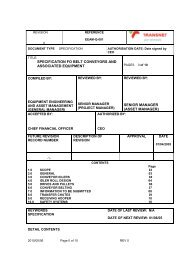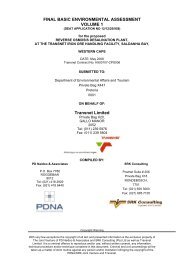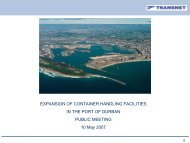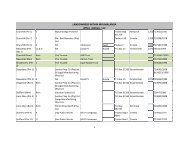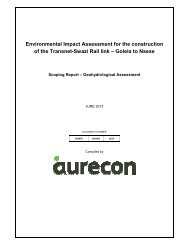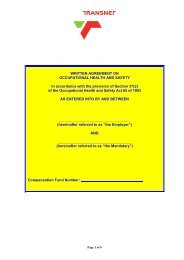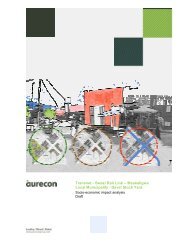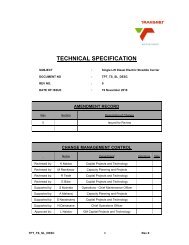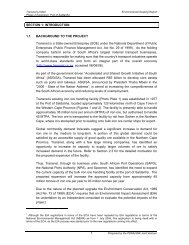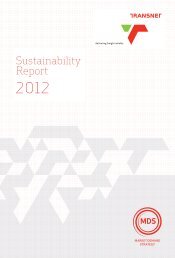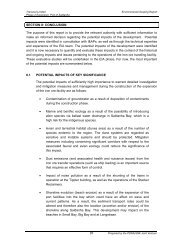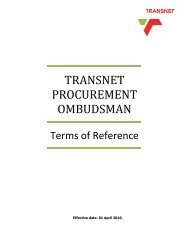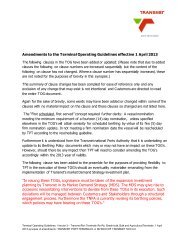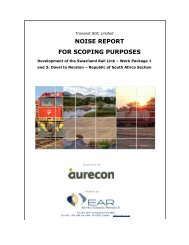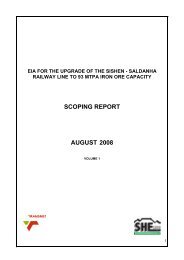Version1: Applicable from 1 April 2011 - Transnet
Version1: Applicable from 1 April 2011 - Transnet
Version1: Applicable from 1 April 2011 - Transnet
Create successful ePaper yourself
Turn your PDF publications into a flip-book with our unique Google optimized e-Paper software.
11.2.5.2. Approximately 30 metres <strong>from</strong> the quay wall landward will no land be<br />
leased to any leaseholder.<br />
11.2.6. Compatibility<br />
11.2.6.1. Compatible commodities will be handled within the same cluster to relieve<br />
contamination and to regulate product handling within clusters. TNPA will<br />
reserve the right to allocate vessels to a berth in such a way, as not to<br />
interfere with operations in the adjoining berth(s), implying that vessel<br />
handling incompatible cargo will not be handled simultaneously and<br />
adjacent to each other.<br />
11.2.6.2. In the event of a cluster not being able to handle the product will lease<br />
conditions prohibiting the cluster <strong>from</strong> handling of product, TNPA will<br />
reserve the right to assign additional handling rights to an alternative<br />
cluster to relieve any congestion that may result.<br />
11.2.7. Stakeholders<br />
11.2.7.1. Berth Planner (Harbour Master)<br />
11.2.7.1.1. A berth planner refers to an employee of TNPA that plans and<br />
allocates vessels to berths; this function will reside in the Harbour<br />
Master's Office.<br />
11.2.7.1.2. The berth planner will be working on a first plan first serve principle<br />
that implies that and unplanned vessels cannot be accommodated<br />
before the planned vessel.<br />
11.2.7.1.3. In the event that two vessels are planned and one amends its arrival<br />
time, the other will be served first, if it maintains its original arrival<br />
time, irrespective of which arrives first.<br />
11.2.7.1.4. In the event where two vessels are planned and both amend their<br />
arrival times, the vessels will be handled on a first-come first-served<br />
principle, to facilitate quicker turnaround times.<br />
11.2.7.1.5. The vessels that stay longer than their planned days on the berth will<br />
lose their status and may be required to move to another berth, if<br />
available or to the outer anchorage in order to avoid delays to the<br />
planned vessels. This will be done at the Berth Planner's discretion<br />
and at the owner's cost.<br />
11.2.7.1.6. Unplanned vessels will be handled on a first come first serve<br />
principle and would have to vacate the berth at least three hours<br />
before the arrival of the planned vessel so as to avoid delays.<br />
Terminal Operating Guidelines: Version 3 – <strong>Transnet</strong> Port Terminals Ro-Ro, Break-bulk, Bulk and Agricultural Terminals: 1 <strong>April</strong> 2013<br />
TRANSNET PORT TERMINALS, A DIVISION OF TRANSNET SOC Ltd 52



